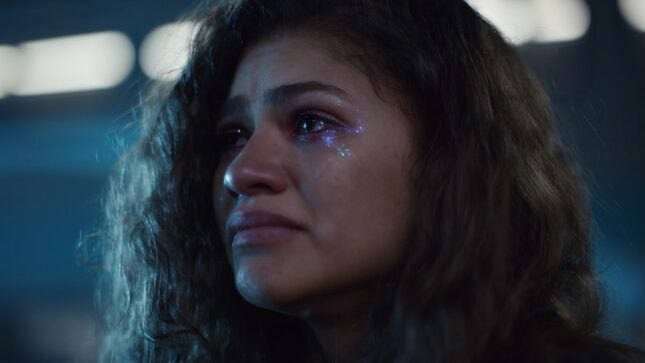
Screenshot: HBO
Nothing has triggered my maternal instinct quite like watching HBO’s Euphoria. The show’s first season, which concluded Sunday night, began with graphic depictions of teen sex and drug use that reminded me just how prudish my sensibilities remain. But once the smoke cleared on the initial shock value of the content, what emerged was a touching and studied story about addiction, codependence, and queer love.
Euphoria stars Zendaya Coleman as the drug-addicted Rue Bennett, recently returned from rehab over the summer after an overdose at home. She quickly becomes entranced by Jules Vaughn (Hunter Schafer), the new girl at school; they form an intense and codependent relationship that flickers between friendship and romance as Rue not only struggles to maintain her sobriety but tries to find a reason to want to stay sober. She finds that reason in Jules, whose flightiness makes it difficult for her to submit to Rue’s all-consuming attention.
In their orbit are the outer limits of their friend group, including Maddy Perez (Alexa Demie), a listless cheerleader caught in a cycle of violence with her abusive boyfriend Nate Jacobs (Jacob Elordi). Nate’s father Cal (Eric Dane) is a small-town big fish who hides his queer predilections from his family and seems to have inspired the same impulse in his son. Kat Hernandez (Barbie Ferreira) is a plus-sized teen whose relationship to her body is developing as she explores her sexuality online through fin-dom sex work. Cassie Howard (Sydney Sweeney) is dealing with her first true love in the shadow of a heavily documented sexual past that exists because of the ways in which boys exploit her. Her boyfriend, Christopher McKay (Algee Smith), is a college freshman dealing with the realization that his NFL dreams are unlikely to come true and sublimating his insecurities onto Cassie.
-

-

-

-

-

-

-

-

-

-

-

-

-

-

-

-

-

-

-

-

-

-

-

-

-

-

-

-

-

-

-

-

-

-

-

-

-

-

-

-








































